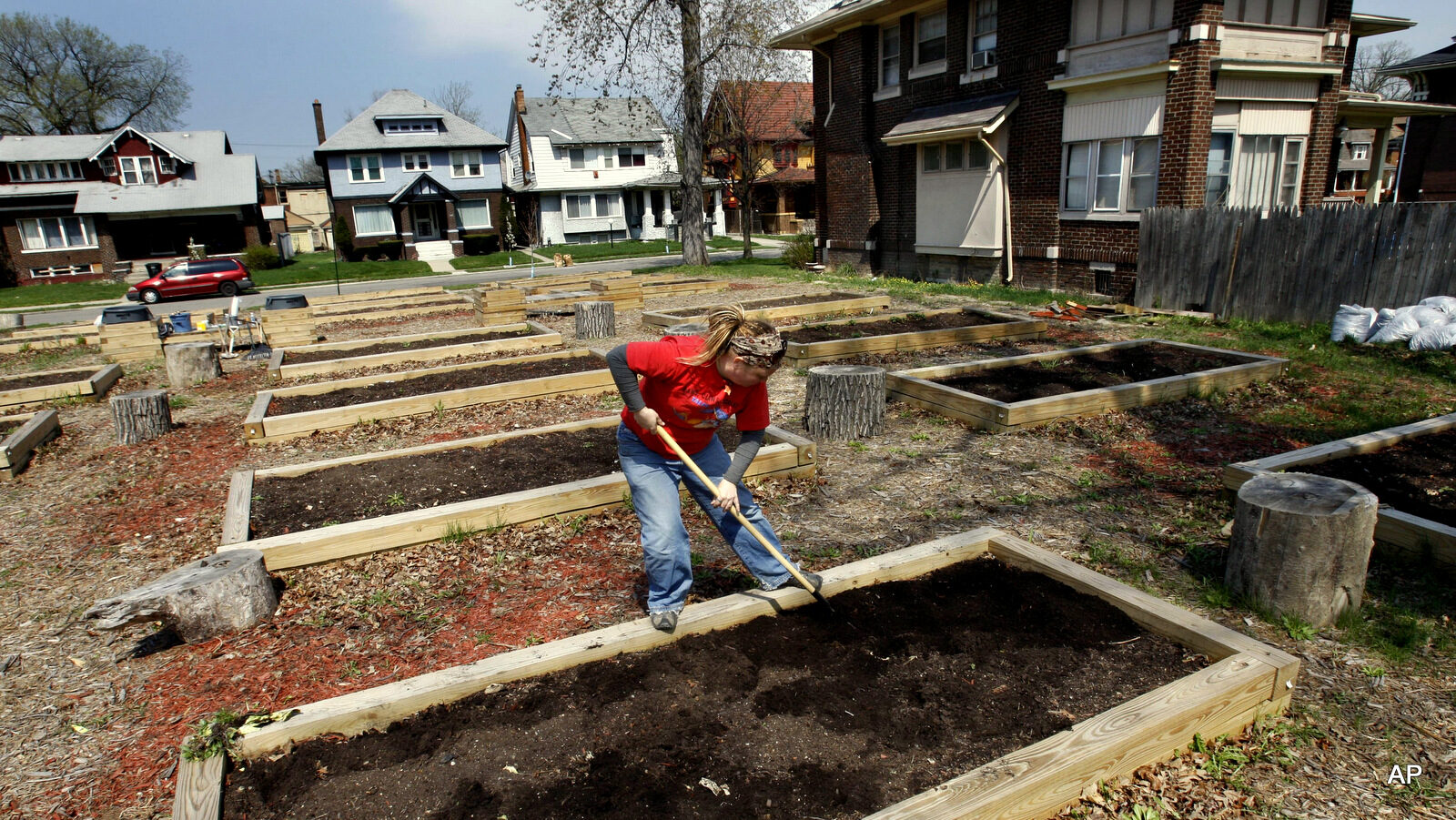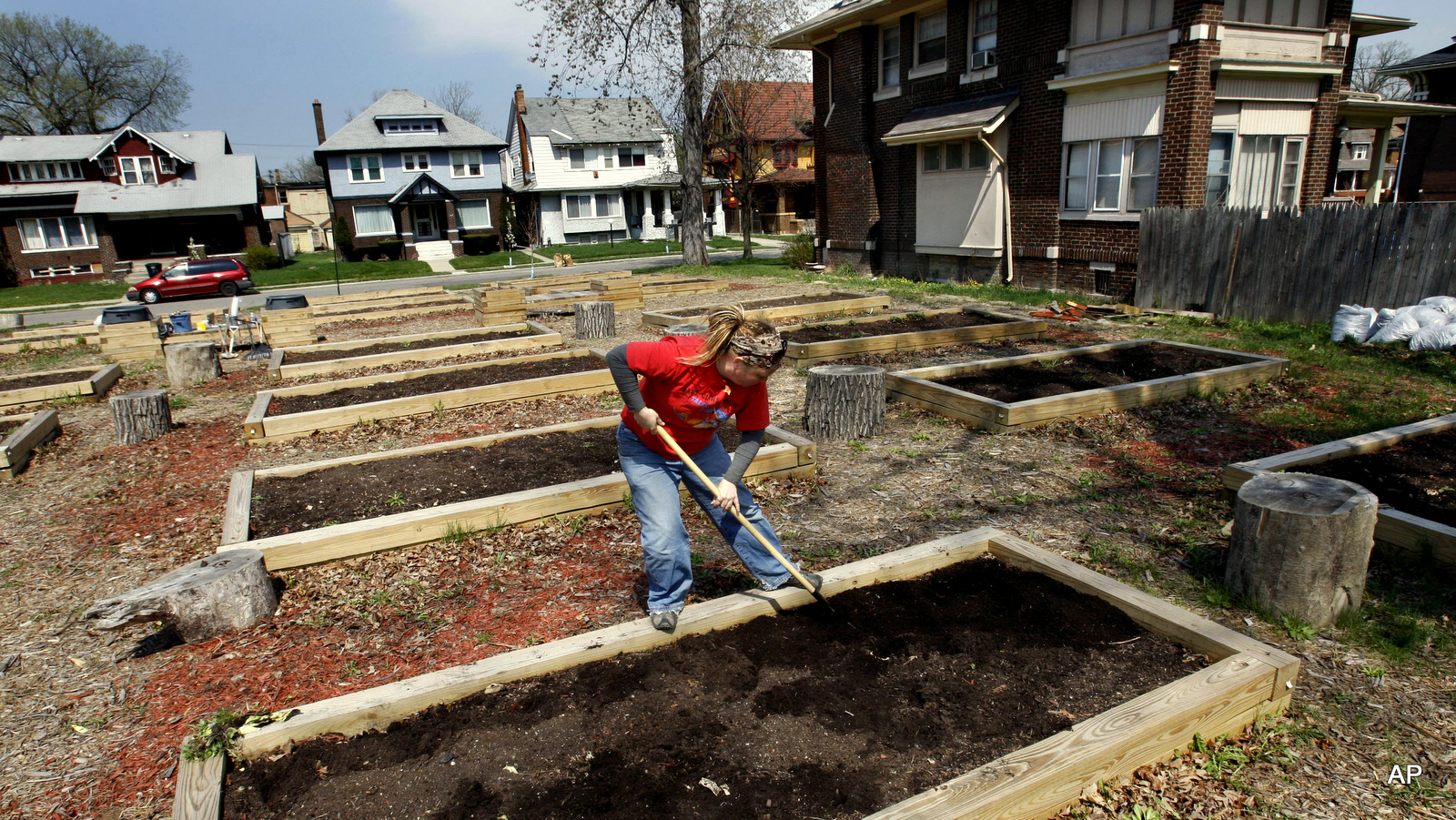
Editor’s Note: This article is Part III in a special series of MintPress exclusives from Detroit. Part I in the series, “Thirsty For Progress: Detroit Water Brigade Makes A Stand Against Water Shut-Offs,” can be found here. Part II, “Think, Don’t Shoot!: Detroit Man Bridges The Security Gap Left By A Failing Police Force,” can be found here.
DETROIT — Walking through the streets of inner-city Detroit means walking through destruction. The things one passes would seem at home in dystopian, post-apocalyptic films, not one of America’s most historic cities.
And it’s exactly this often advertised notion of Detroit — the city as a wasteland, a has-been of a metropolis, and little more than a home to excellent urban exploration — that Detroiters are coming together to dismiss.
Caprice Wood is an active participant in the growing population of urban farms, social experiments, and other community initiatives that are springing up around the city of Detroit. She’s part of Earthworks Urban Farm’s Earthworks Agriculture Training (EAT) program, a nine-month volunteer training program that specializes in showing community members how to become urban gardeners and farmers.
She’s quick to note, though, that what Detroit is going through isn’t a “revival.” She told MintPress: “This is not a revival, it’s people reawakening to what is important.”
Cultivating a community
Since its inception as an offshoot of the Capuchin Soup Kitchen in 1997, Earthworks Urban Farm has blossomed into gardens spread throughout several lots, the EAT program and a growing list of volunteers. The farm, which supplies the soup kitchen, is run by a team volunteers who also educate the community about sustainable food practices.
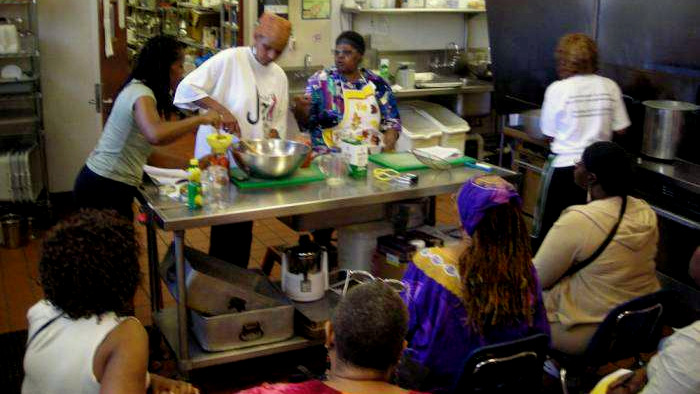
Like many of the city’s urban farming and community gardening initiatives, Earthworks has started taking advantage of empty homes and lots, converting them into storage and planting spaces.
Detroiters have always taken care of themselves, Caprice Wood told MintPress. She added: “It might be new for the younger generation but the older generations have been doing this their whole life.”
Jaleel Muhammad, the education assistant with Earthworks, agrees, but goes a step further. He told MintPress, “There is a synergistic relationship that forms around having a garden in the center of the community.”
Muhammad develops urban farming- and gardening-related curriculum for young learners at the James and Grace Lee Boggs Educational Center. He also works with a parent committee that is attempting to get healthier foods into school cafeterias.
While there are legitimate criticisms to be levied against Detroit, Muhammad says more people should dig a bit further beneath the surface. “There’s a change happening with the people here that you can see,” he said. “Much more than agricultural, a spiritual change is taking place in the minds of the people.”
Kay Morgan is another volunteer in the EAT program, who says she was called to gardening after living most of her adult life without exposure to sustainably-minded projects.
”I was not exposed to gardening and farming growing up,” Morgan told MintPress. “I feel like I missed out.”
In addition to volunteering with the EAT program, Morgan works with the Michigan 4-H Youth mentoring program that specializes in mentoring people ages five to 19 and teaching a range of life skills. Morgan explained: “We teach kids to sew, grow food, baking, economics, and how to be healthy and self-sufficient.”
An evening of community, soup and budding businesses
Activists, entrepreneurs and concerned citizens who are coming together to reclaim the image of their city aren’t stopping at urban farming, though. One of the latest models for community building is Detroit SOUP.
Detroit SOUP started out as a dinner in the city’s Mexicantown neighborhood in 2010. Members of the community were invited to eat soup and have the opportunity to support projects that needed assistance. It has since evolved into a monthly dinner focusing on micro-grants for creative projects.
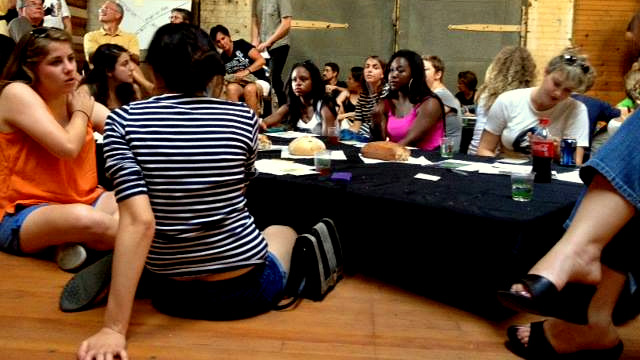
For a $5 donation, those attending receive soup, salad, bread and a vote. They listen to presentations from four different presenters, who are each allotted four minutes to share their idea and additional time to field four questions from the audience. Then, everybody eats and votes for their favorite project. The winner receives the donations, plus a matching fund from Detroit SOUP, and they are encouraged to come back to a subsequent dinner to share their stories.
The SOUP model is a radical new way to look at funding projects that might otherwise never receive the attention they deserve. Since its inception, Detroit SOUP has raised over $95,000 dollars for community projects. Beginning in 2012, SOUP expanded from a single event, to smaller events held in neighborhoods throughout the city.
Brittany Sanders, board leader for the Central Communities neighborhood SOUP, says she is interested in events like SOUP because they give “the activists within the community a platform to further develop their skills or business.”
After living away from the city for ten years and defending Detroit from outside attacks, Sanders decided to move home and get involved. “I want to be an active part of the revitalization,” she told MintPress.
Central Communities SOUP has raised over $3,000 for neighborhood projects, including supporting the fledgling businesses of community members like Dawn Harden. Her project idea, Dawn’s Gifted Creations, was the winner of the April 29 SOUP event. She specializes in personalized gift baskets and fishbowl tableaus that she began making as a hobby for friends and neighbors. She told MintPress that she’s thrilled to have this support, which will allow her to continue to ply her craft.
“I want to make people happy. To lift their spirit,” Harden told MintPress. “This is therapy for me as well.”
While the $600 Harden won that evening will not launch her business immediately, it might set her on the path toward sustainability and eventually she could do her craft full-time. “I will be able to get supplies. Also it gives me a positive feeling that I am inspiring people, it encourages me to go further,” she said.
Building atop the ashes of everything that came before
Empty factories, schools, government buildings and homes dot the city of Detroit. Many of the abandoned homes have been burned down by criminals covering up nefarious activity, vandals, or rental insurance scammers. The Detroit News reported in February that 17 people died from intentionally set fires last year, and the city has spent $3.5 million to demolish almost 250 homes damaged by fire over the past five years.
Yet among the flames and the wreckage, a generation of sustainability-minded activists is rising up to forge new communities amid what’s left of the old. These pioneers come from in and around Detroit, and even as far away as Brooklyn and Houston.
One of these communities encompasses several different homes and buildings, operating on different streets within a couple miles of each other. Fireweed UniverseCity, The Universe Building, and Dr. Bob’s Innate Healing Arts Center and Golden Gate Cafe are an active hub of learning and creation within Detroit’s inner-city.
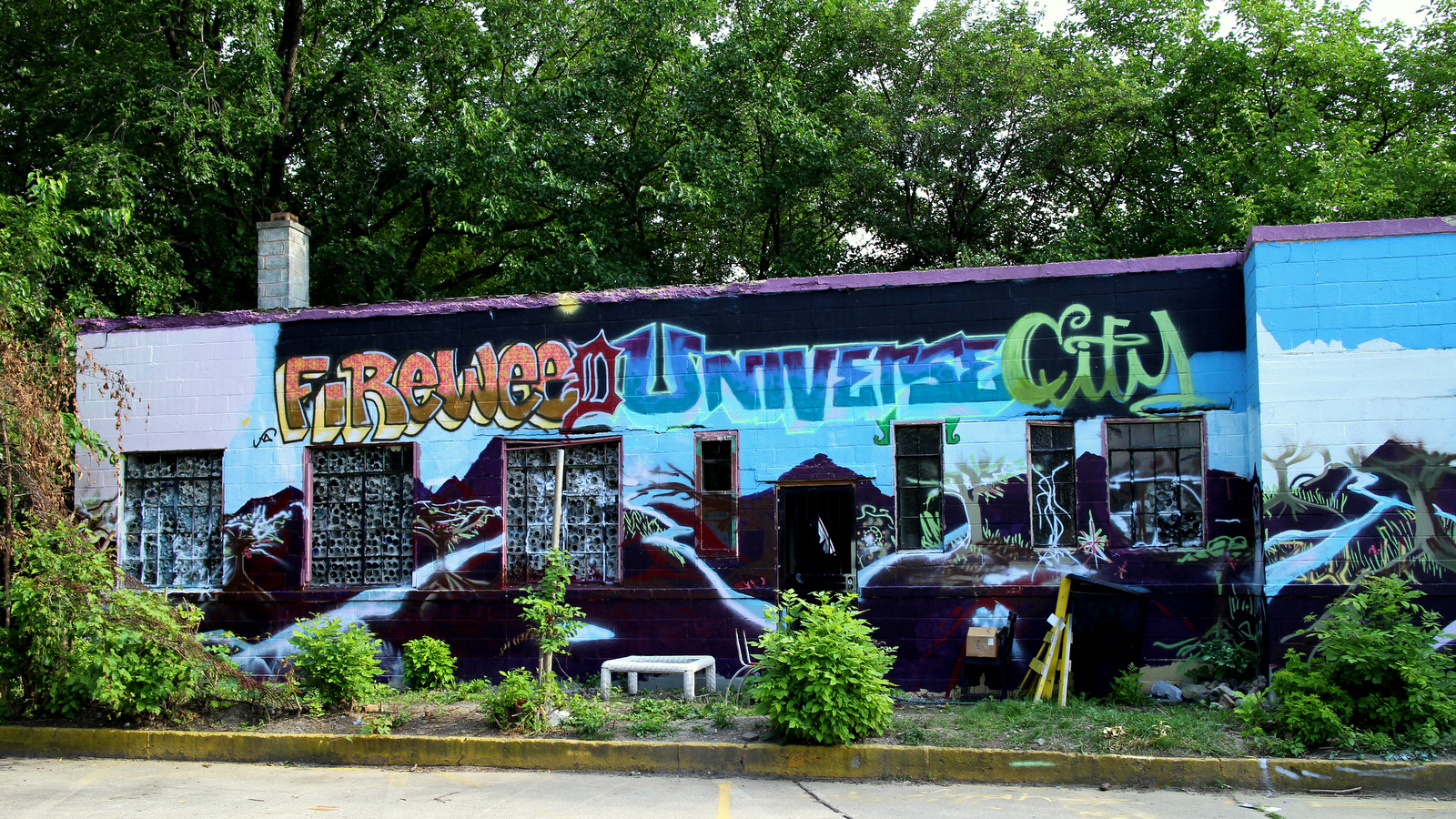
Fireweed describes the community as a “grassroots, not-for-profit movement to transform a devastated, burned-out Detroit city neighborhood into a sustainable, eco-friendly, intentional community.” But, essentially, friends from around the city and surrounding area have moved into several houses on the same block, and they’re using it as their homebase for projects geared toward cleaning up the community and building urban gardening projects. There is a mix of squatting, attempts at adverse possession, and outright purchasing of the inexpensive properties.
The nearby Universe Building serves as a space for community events, potlucks, meetings, music, and anything else the community dreams up and decides to do. Dr. Bob’s is a similar multi-purpose space, hosting a chiropractic office, vegan cafe, drum circle gathering, and generally serving as an intersection between the spiritual and activist realms that cross-pollinate at the three locations.
An abundance of ideas is being generated between these three spaces, and the general consensus is that Detroit is a place for goal-driven individuals who have the capacity to work hard to bring their ideas to fruition.
Hidden amongst one of Detroit’s many emptied streets, is a house with a sign out front that reads “Project Eco-Grid.” Nathan Paris, of Cincinnati, Ohio, says the project is about implementing change on a community-wide scale, focusing on bettering human habitation and transportation. “We are moving to less of a focus on money and more focus on individual goals rather than a search for money,” Paris told MintPress.
Paris was living in a shipping container on two acres in Ohio before he decided to come to Detroit with a few friends to officially launch Project Eco-Grid. “I want to connect the projects in Cincinnati with Detroit. We can trade resources and ideas, basically be sister communities,” he explained.
Paris is also part of the growing “tiny house movement”– a global community that believes in downsizing homes for a variety of reasons. The abodes are generally under 1,000 square feet. Project Eco-Grid plans to house people in tiny houses and explore aquaponics for food production.
The group is already working on alternative transportation models. One of its first projects includes a velomobile, a human-powered vehicle, typically made for a single-passenger and consisting of three wheels.
Despite hardships, including the freezing winters and the trepidation of local residents, Paris is determined to make his mark in the city. He sees Project Eco-Grid as one of the many inspirational examples of what’s possible in the Motor City. The efforts of these communities may have humble beginnings, but Paris is not shy about the grand vision for the city.
He told MintPress: “We want to show people that fulfilling your dreams is possible.”


